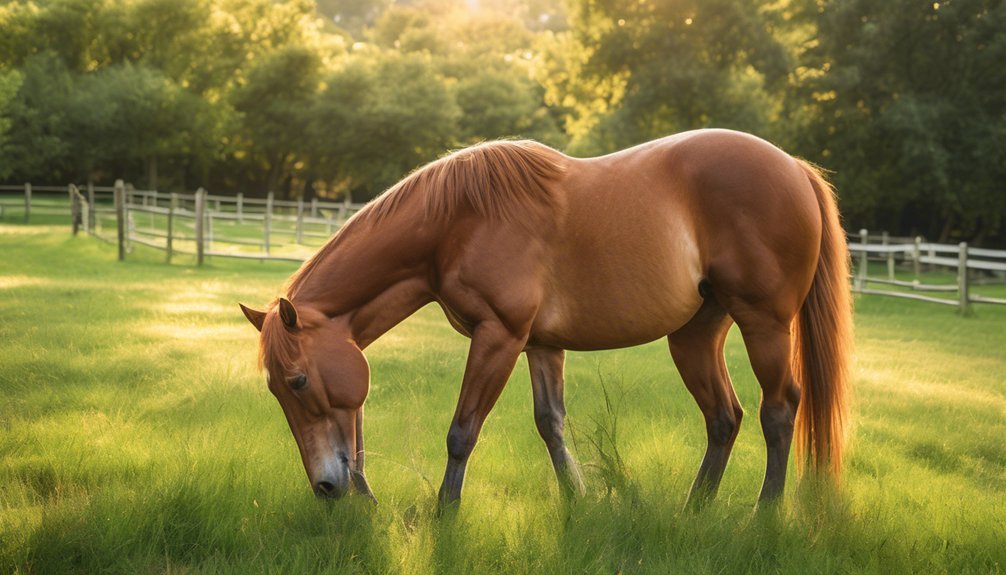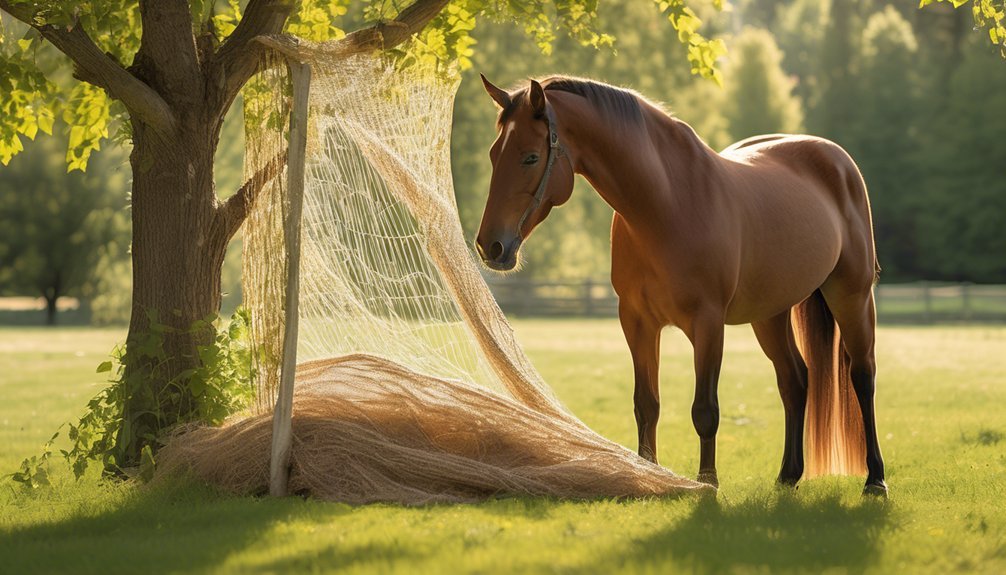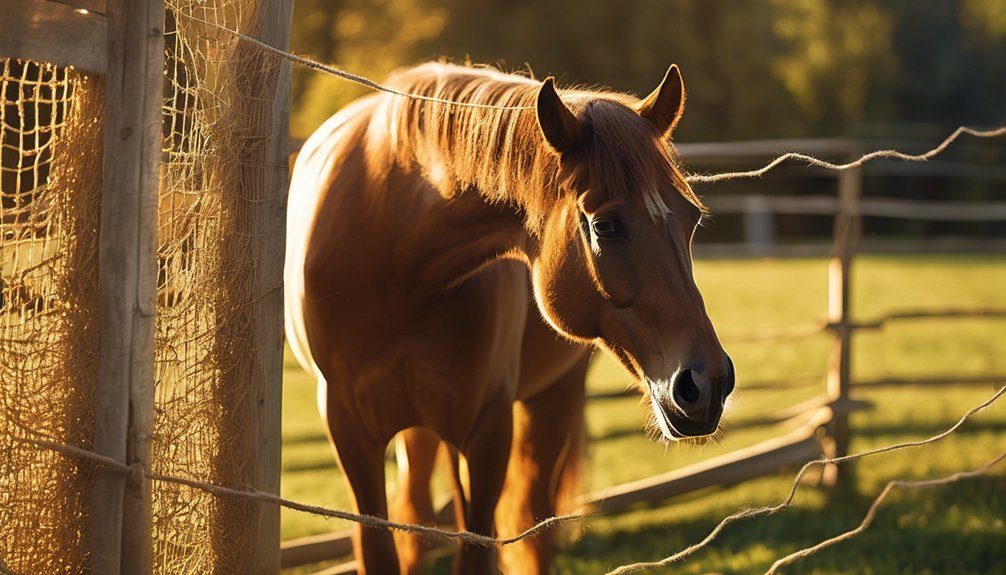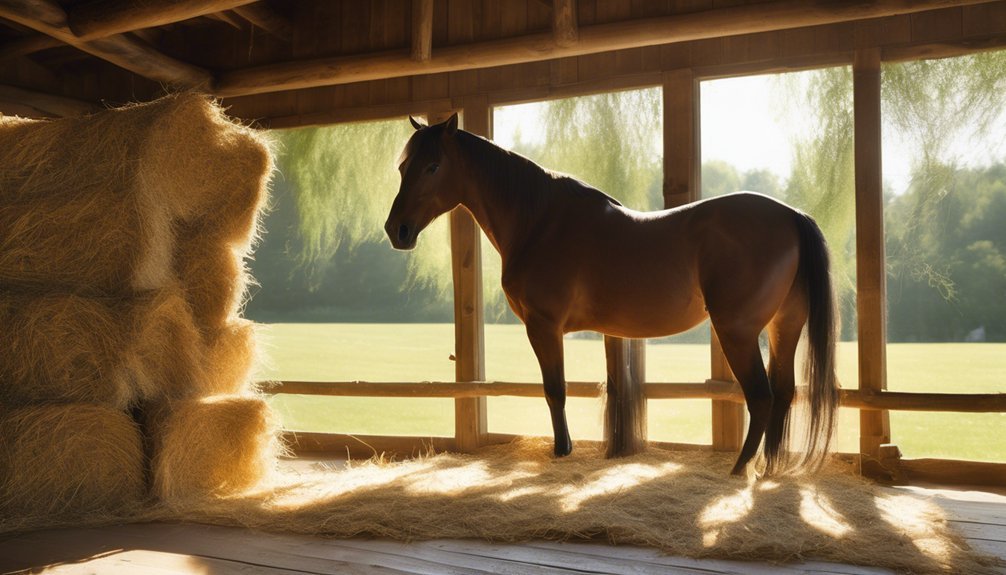
Imagine a horse in a field, grazing peacefully, embodying the essence of natural health. Slow feeding, paired with hay nets, mirrors this instinctive behavior, promoting a balanced diet and reducing digestive issues. By encouraging your horse to eat in a way that replicates their natural foraging, you can support their overall well-being. However, the transition to this method brings up several considerations that are crucial for both you and your horse's health.
Key Takeaways
- Slow feeding mimics natural grazing, promoting digestive efficiency and reducing colic risks by stabilizing stomach acidity and preventing overeating.
- Hay nets encourage foraging behavior, enhancing mental stimulation and reducing boredom, leading to a happier and healthier horse.
- Extended feeding times from slow feeders increase saliva production, aiding digestion and maintaining gut health.
- Slow feeding routines help lower stress levels by providing a more natural eating rhythm, improving overall well-being.
- Transitioning to slow feeding should be gradual, ensuring horses adapt positively without frustration or anxiety.
Understanding the Natural Grazing Behavior of Horses

Understanding the natural grazing behavior of horses is crucial for promoting their overall health and well-being. Horses are designed to graze for up to 16 hours a day, exhibiting natural behavior that reflects their instinctive need to forage and consume small amounts of food frequently.
Their grazing patterns involve selecting a variety of grasses, which not only provides essential nutrients but also keeps their digestive systems functioning optimally. When you observe your horse, notice how they choose different patches of grass, often moving slowly to nibble and savor each bite.
This natural rhythm helps prevent boredom and stress, while also encouraging social interactions with other horses. Recognizing these behaviors allows you to create an environment that caters to their innate needs, fostering a happier, healthier life.
Benefits of Slow Feeding for Digestive Health
As you consider your horse's digestive health, incorporating slow feeding methods can significantly enhance their well-being.
Slow feeding promotes digestive efficiency by encouraging your horse to graze as they'd in a natural setting. This mimics their instinctual behavior, allowing for better forage management, which leads to improved nutrient absorption.
By extending feeding times, you reduce the risk of overeating and promote saliva production, which aids in digestion. Furthermore, slow feeding helps maintain a stable gut environment, minimizing the chances of digestive upset.
Ultimately, adopting slow feeding methods not only supports your horse's digestive health but also fosters a deeper bond as you nurture their natural behaviors and needs.
Prioritizing this approach can lead to a happier, healthier equine companion.
How Slow Feeders Reduce the Risk of Colic

When you implement slow feeders, you're actively reducing your horse's risk of colic, a serious and often painful condition.
By allowing your horse to graze slowly, you enhance colic prevention through improved digestive health. Here are some key benefits:
- Increased feeding frequency mimics natural grazing patterns.
- Reduced risk of overeating and gulping air.
- Stabilized stomach acidity through consistent forage intake.
- Better hydration as your horse consumes more water with hay.
- Lower stress levels due to a more natural feeding rhythm.
These factors work together to create a balanced digestive environment, minimizing the chances of colic.
Enhancing Mental Stimulation With Hay Nets
While many horse owners focus on physical health, enhancing your horse's mental stimulation through the use of hay nets can significantly improve their overall well-being.
Hay nets not only slow down their feeding but also provide essential feeding enrichment that encourages natural foraging behaviors. As your horse works to pull hay from the net, they engage their minds, promoting mental engagement that can reduce boredom and anxiety.
This active problem-solving process mimics their natural grazing habits, offering a fulfilling experience. Additionally, using hay nets can keep your horse occupied for longer periods, allowing for a more relaxed state.
Choosing the Right Slow Feeder for Your Horse

Selecting the right slow feeder for your horse involves understanding both their individual needs and the various options available on the market.
Consider the following slow feeder types and sizing considerations to find the perfect match:
- Material: Choose between plastic, netting, or wooden feeders.
- Hole Size: Smaller holes promote slower eating but may frustrate some horses.
- Capacity: Ensure it holds enough hay to last your horse throughout the day.
- Style: Look for ground, wall-mounted, or portable designs based on your space.
- Ease of Cleaning: Consider how simple it's to maintain the feeder's hygiene.
Tips for Properly Using Hay Nets
To maximize the benefits of hay nets for your horse, it's essential to use them correctly. Start by selecting the right hay net sizes; a smaller mesh can encourage slower eating, which is ideal for maintaining your horse's digestive health.
Employ proper netting techniques as you fill the hay net, ensuring it's evenly distributed to prevent your horse from becoming frustrated. Always hang the net at a comfortable height, allowing your horse to eat without straining.
Regularly inspect the net for wear and tear, replacing it as needed to maintain safety. Lastly, consider introducing the hay net gradually, giving your horse time to adjust and appreciate the slower feeding process. This thoughtful approach fosters a positive feeding experience.
Addressing Common Concerns About Slow Feeding

As you consider the shift to slow feeding for your horse, it's natural to have concerns about its impact on their eating habits and overall health.
Here are some common worries that often arise:
- Fear of weight loss due to slower eating
- Concerns about hay net safety and durability
- Misunderstandings surrounding slow feeding myths
- Anxiety over potential digestive issues
- Doubts about the cost-effectiveness of slow feeding equipment
Addressing these hay net concerns is crucial.
Many horses adapt well to slow feeding, eating at a comfortable pace without losing weight.
Quality hay nets minimize risks and provide a safe feeding environment.
The Impact of Grazing Time on Horse Well-being
Grazing time plays a significant role in a horse's overall well-being, impacting both their physical health and mental state. The duration of grazing directly influences grazing patterns, which can affect forage intake and, consequently, health indicators.
When pasture quality is high and feeding frequency is consistent, your horse's stress levels decrease, fostering a relaxed demeanor. Insufficient grazing time can lead to behavioral changes, such as boredom or anxiety, as they seek alternative stimulation.
Transitioning Your Horse to a Slow Feeding Routine

Transitioning your horse to a slow feeding routine can significantly enhance their digestive health and overall well-being.
To make this shift successful, consider these transition strategies:
- Start with small hay nets to gauge your horse's reaction.
- Gradually introduce the slow feeding method over a week.
- Monitor your horse's eating habits closely during this period.
- Adjust the size of the hay portions to avoid frustration.
- Ensure fresh, clean water is always available.
Success Stories: Horses Thriving With Slow Feeders and Hay Nets
Many horse owners have reported remarkable improvements in their horses' health and behavior after incorporating slow feeders and hay nets into their feeding routines.
Success stories abound, with testimonials highlighting reduced stress levels and improved digestion. For instance, one owner noticed her horse, previously prone to colic, thrived on the constant forage availability.
Another shared how her mare's anxiety diminished, thanks to the slow feeding method mimicking natural grazing. These changes aren't just anecdotal; they're backed by enhanced weight management and overall vitality.
The intimate bond between you and your horse deepens as you observe these positive transformations.
Investing in slow feeders and hay nets is more than a feeding choice; it's a commitment to your horse's well-being.
Frequently Asked Questions
Can Slow Feeding Help With Weight Management in Horses?
Yes, slow feeding can promote weight loss in horses by regulating their intake. It encourages better digestive health, ensuring steady forage access, reducing overeating, and preventing colic, which ultimately supports their overall well-being and weight management.
How Often Should I Refill Hay Nets?
Did you know that horses naturally graze for 16 hours a day? To mimic this, you should refill hay nets every few hours, ensuring a consistent feeding frequency that promotes their health and well-being.
Are There Specific Hay Types Better for Slow Feeding?
When selecting hay for slow feeding, consider timothy hay and orchard grass for fiber, alfalfa hay for protein, and coastal hay for variety. Mixed grass options can also provide premium quality nutrition your horse will appreciate.
Do Slow Feeders Work for All Horse Breeds?
Slow feeders can benefit all horse breeds, but their effectiveness depends on each breed's behavior and feeding preferences. Observing your horse's unique habits will help you determine the best approach for their individual needs.
Can Slow Feeding Improve My Horse's Behavior?
Yes, slow feeding can enhance your horse's behavior significantly. By promoting consistent feeding habits, you'll notice behavioral changes such as reduced anxiety and improved focus, leading to a more relaxed and manageable companion in your care.
Conclusion
Incorporating slow feeding and hay nets into your horse's routine can transform their health and happiness in ways you might not expect. Imagine watching your horse graze contentedly, their natural instincts ignited, while you feel the peace of mind that comes from knowing you're preventing potential digestive issues. As you take this step, consider the joy of witnessing a thriving, engaged horse—one that not only feels better but also shares a deeper bond with you. What will you discover next?





